Beirut- Syria’s week-old ceasefire has officially entered a shaky phase after violations expanded their target range beyond the northern Rif Dimashq Governorate reaching east of rural Aleppo. Syrian opposition forces have urged the United Nations’ Security Council and truce monitoring international forces for an immediate intervention.
French President Francois Hollande demanded that pro-regime forces abide completely by the ceasefire and save no effort in giving the Geneva a chance.
U.N. Special Envoy Staffan de Mistura told international correspondents that preparations for Syria negotiations are on the right path, reiterating the international community’s trust in Russian and Turkish efforts to bring the ceasefire to success.
Preparations are currently underway for the multilateral meeting, led by Turkey and Russia, in Astana, Kazakhstan on January 23 to discuss the Syrian crisis, de Mistura affirmed Thursday.
The talks aim at implementing the comprehensive ceasefire in Aleppo, ending the Syrian crisis, and resuming peace negotiations between warring Syrian sides, Mistura said in a press conference.
De Mistura has set Feb. 8 for the next round of U.N.-mediated talks on Syria in Geneva.
He considered the case on Russian and Turkish influence reaching out to conflicting sides in Syria a hopeful one. It would help to ensure the full implementation of the ceasefire and the success of the Syria peace talks in Astana.
The U.N. plans on sending a representative to attend the Astana talks, in addition to employing any positive outcomes in order to ensure the steady progress of Syrian reconciliation during the February Geneva talks, de Mistura noted.
De Mistura’s humanitarian advisor Jan Egeland told reporters that Russia and Turkey brokered the ceasefire agreement on December 30, 2016, and have pledged to work to provide more access for aid and relief agencies to deliver humanitarian supplies across Syria.
Despite the ceasefire agreement, U.N. aid convoys are currently still struggling to gain access to a number of Syrian cities to deliver humanitarian aid and assistance to stranded civilians, Egeland noted, adding that U.N. relief teams were prevented from accessing areas in Rural Damascus, Homs, and Hama.
